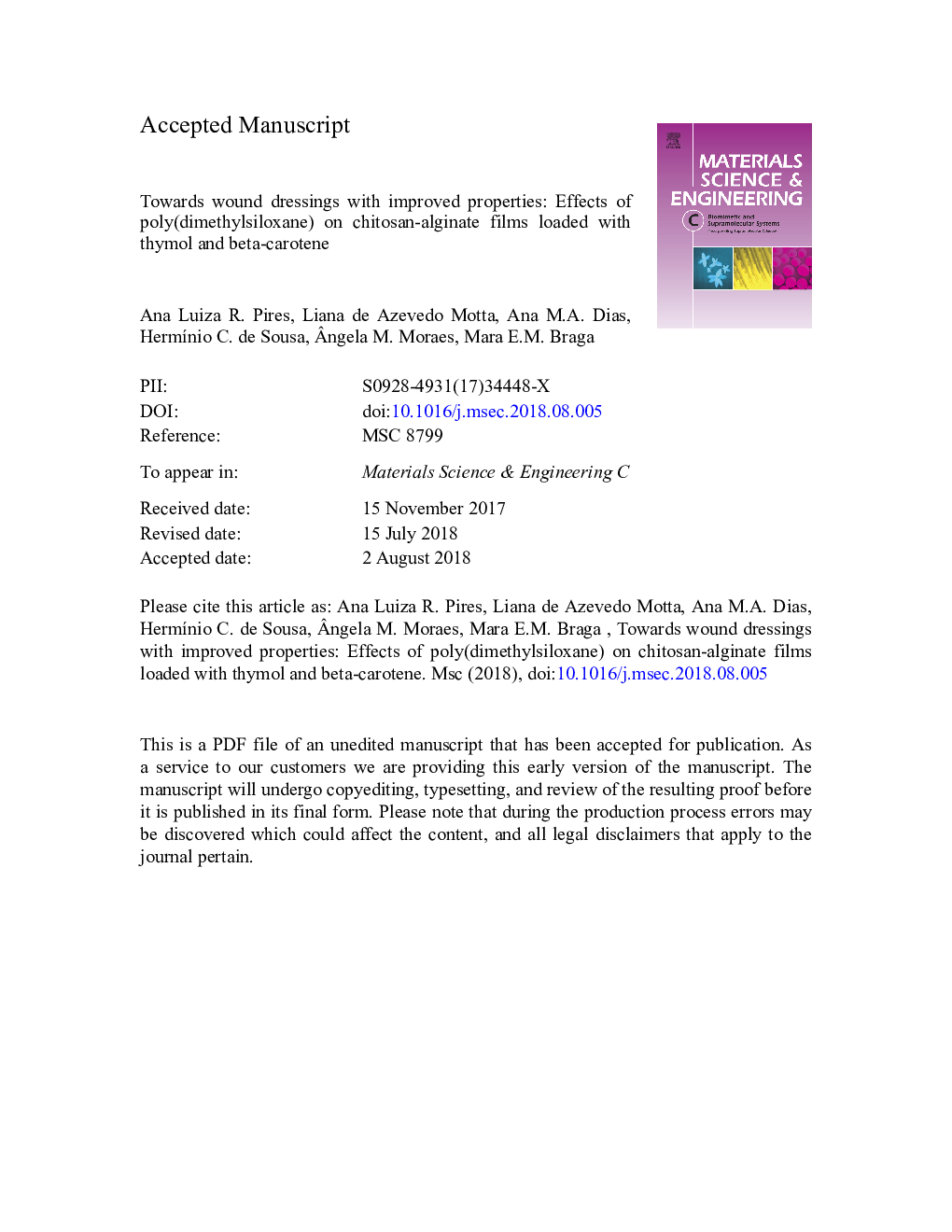| کد مقاله | کد نشریه | سال انتشار | مقاله انگلیسی | نسخه تمام متن |
|---|---|---|---|---|
| 7865707 | 1509128 | 2018 | 40 صفحه PDF | دانلود رایگان |
عنوان انگلیسی مقاله ISI
Towards wound dressings with improved properties: Effects of poly(dimethylsiloxane) on chitosan-alginate films loaded with thymol and beta-carotene
ترجمه فارسی عنوان
در کنار تارهای زخم با خواص بهبود یافته: اثرات پلی (دی متیل سیلوکسان) بر روی فیلم های کیتوزان آلژینات لمین شده با تیمول و بتا کاروتن
دانلود مقاله + سفارش ترجمه
دانلود مقاله ISI انگلیسی
رایگان برای ایرانیان
کلمات کلیدی
کیتوزان، آلژینات، پلی (دی متیل سیلوکسان)، بیولوژیک های طبیعی بر اساس، ضایعات پوستی،
موضوعات مرتبط
مهندسی و علوم پایه
مهندسی مواد
بیومتریال
چکیده انگلیسی
This study aimed to evaluate the effect of poly(dimethylsiloxane) on the mechanical properties of chitosan-alginate (CA) polyelectrolyte complexes (PECs) with potential application as wound dressing biomaterials. For that purpose, different amounts of poly(dimethylsiloxane) were incorporated during the formulation of the PECs. Results showed that the highest tensile strength was observed when using 0.1â¯g of poly(dimethylsiloxane) per gram of PEC (CAS10). This formulation was also non-hemolytic, capable of inducing thrombus formation to potentially reduce bleeding, and additionally presented high stability when exposed to physiological fluids and/or conditions simulating patient bathing. To improve its wound healing capacity, this formulation was loaded with thymol and beta-carotene (anesthetic, anti-inflammatory and antioxidant compounds) by the supercritical carbon dioxide impregnation/deposition (SSI/D) method at 250â¯bar and 45â¯Â°C for 14â¯h and at two depressurization rates (5 and 10â¯bar/min). The PECs were also loaded by conventional impregnation in solution for comparison purposes. Higher bioactive loadings, of 1.8â¯Â±â¯0.2 and 1.3â¯Â±â¯0.03â¯Î¼g per milligram of PEC for thymol and beta-carotene, respectively, were observed when using SSI/D and a higher depressurization rate (10â¯bar/min). These values do not correspond to the maximum loaded amount of each bioactive, which were strongly retained in the PEC structure due to favorable bioactive-polymer interactions, originating matrices that should present a more sustained release during in vivo applications.
ناشر
Database: Elsevier - ScienceDirect (ساینس دایرکت)
Journal: Materials Science and Engineering: C - Volume 93, 1 December 2018, Pages 595-605
Journal: Materials Science and Engineering: C - Volume 93, 1 December 2018, Pages 595-605
نویسندگان
Ana Luiza R. Pires, Liana de Azevedo Motta, Ana M.A. Dias, HermÃnio C. de Sousa, Ãngela M. Moraes, Mara E.M. Braga,
